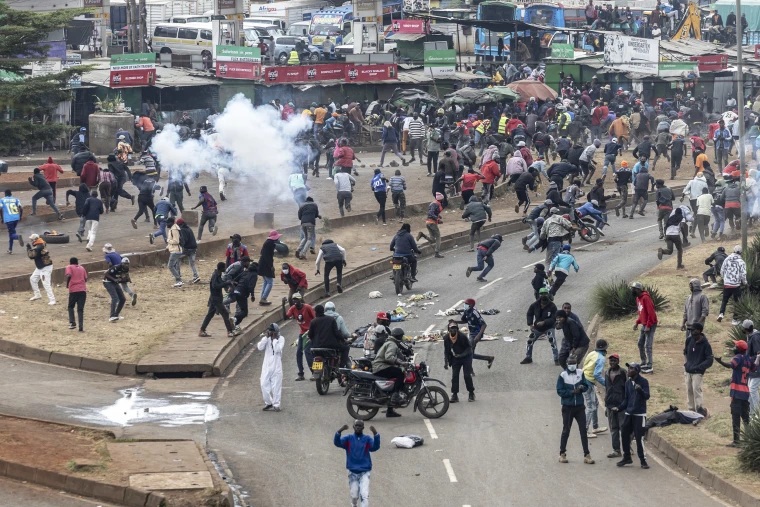Nairobi, Kenya — Kenyan President William Ruto has sparked controversy by instructing police to shoot protesters in the legs.
This directive targets individuals damaging businesses or property during demonstrations.
Furthermore, the president clarified that the goal is to incapacitate offenders without causing fatalities.
Nevertheless, his comments have faced backlash from human rights organizations and international bodies.
Moreover, this directive arises amid a surge of violent anti-government protests that have overwhelmed the nation.
These protests have resulted in significant casualties and extensive destruction across various regions.
According to the Kenya National Commission on Human Rights (KNCHR), at least 31 individuals died on Monday.
Additionally, more than 100 people sustained injuries, while over 500 were arrested.
In contrast, Kenya’s police force reported a lower death toll of 11.
Rising Tensions and Deadly Protests
Initially, the protests commemorated Kenya’s long struggle for democracy. However, they quickly escalated into violent clashes across 17 counties.
Demonstrators passionately chanted slogans like “Ruto must go” and “wantam.”
They demanded that the president resign after serving only one term in office.
Furthermore, the unrest intensified due to growing economic challenges, including rising youth unemployment, tax increases, and allegations of police brutality.
Tragically, a 12-year-old child became a victim, struck by a stray bullet while at home in Kiambu.
The UN High Commissioner for Human Rights expressed deep concern regarding the use of lethal ammunition, rubber bullets, and tear gas.
Additionally, water cannons were deployed against protesters, raising serious human rights issues.
“The sharp rise in the death toll is deeply troubling,” stated Ravina Shamdasani, a spokesperson for the UN body.
President Ruto Defends His Stance
In a televised address on Wednesday, President Ruto strongly defended the actions of security forces while emphasizing his commitment to maintaining order.
He asserted, “Kenya cannot and will not be ruled through threats, terror, or chaos. Not under my watch.”
Additionally, he highlighted the importance of lawfulness and security in governance.
Furthermore, he cautioned that any assaults on police and security personnel would be classified as acts of war.
This declaration highlights the government’s commitment to safeguarding its officers while ensuring societal peace.
Ruto’s remarks demonstrate a resolute stance against violence and disorder within Kenyan society.
In addition, the president rejected demands for his resignation, asserting that government changes must follow constitutional procedures.
He firmly stated, “This country will not be destroyed by a few impatient individuals seeking unconstitutional methods for change.”
Instead, he encouraged his political opponents to await the forthcoming 2027 general elections.
Human Rights Concerns
Human rights organizations and religious groups have strongly condemned the violence and called for an independent investigation into the killings, destruction of property, and arbitrary arrests.
The KNCHR reported extensive looting and vandalism during the protests.
Moreover, attackers targeted hospitals, stealing medical equipment and harassing staff.
“The KNCHR strongly condemns all human rights violations and urges accountability from all responsible parties, including police, civilians, and other stakeholders,” the commission stated.
Opposition leaders accuse the government of deploying armed gangs in unmarked police vehicles to strongholds during protests.
They allege state-sponsored violence and extrajudicial killings serve to suppress dissent effectively.
Consequently, opposition groups call for a national boycott of businesses affiliated with Ruto’s administration.
“This regime is hostile; therefore, it cannot be reasoned with.
We must resist it firmly. We will not rest, retreat, or surrender,” opposition leaders assert in a joint statement.
Economic Challenges Fueling Discontent
The protests have highlighted Kenya’s economic struggles, particularly high youth unemployment rates and dissatisfaction with job quality.
Recent tax hikes have significantly worsened these issues.
Consequently, they place additional strain on household budgets, making financial stability challenging.
President Ruto acknowledged these challenges but argued that they predate his administration, which began in 2022.
“My government is the first to take deliberate steps to address youth unemployment,” Ruto said, questioning why his administration has faced more criticism than previous regimes.
He also warned against ethnic politics and urged unity to ensure peace and stability in the country.
Calls for Accountability
Kenya’s Chief Justice Martha Koome has cautioned against escalating violence during protests, emphasizing the risk it poses to the nation’s democratic principles.
Meanwhile, government spokesperson Gabriel Muthuma admitted that there had been incidents of excessive force by police officers and noted that some officers are under investigation.
Despite these assurances, international bodies like the UN have expressed alarm over the use of disproportionate force against civilians.
Religious leaders and human rights advocates are urging swift action to hold perpetrators accountable and restore public trust in law enforcement.
As Kenya grapples with rising tensions and mounting criticism of its leadership, the nation faces a critical juncture in its democratic journey.
Whether through dialogue or continued unrest, the path forward remains uncertain.



